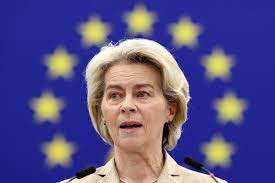Andrew Hammond
EU presidents and prime ministers have a huge, diarized agenda in their upcoming meetings, ranging from enhancing Europe’s economic competitiveness to the Ukraine war. However, on the sidelines of these sessions lurks another big issue for the bloc’s future: the growing momentum behind a second term for European Commission President Ursula von der Leyen.
Von der Leyen, who took office in 2019, is becoming the most powerful person in Brussels since Jacques Delors in the 1980s and 1990s. A key conundrum in the coming months will be if she can now develop an era-defining agenda like the one that put Delors, who was behind economic projects such as the single market and single currency, in the history books.
The growing momentum behind Von der Leyen comes despite her multiple missteps in the top job. This includes when she was criticized last autumn for her unremittingly pro-Israel stance during her trip to the country. However, given the slim prospects of European Council President Charles Michel getting a second term this year, the argument is building among the bloc’s 27 presidents and prime ministers that some institutional continuity is needed at the top of the Brussels bureaucracy. This is partly why Von der Leyen’s star is so high.
On the sidelines of the big meetings, right-of-center politicians in the ruling European People’s Party are actively discussing her candidacy for a second term. While Von der Leyen has not yet publicly announced, there is a growing expectation that she will declare her intentions soon, possibly at a key German Christian Democrats event in Berlin in mid-February. Yet, while momentum is clearly behind Von der Leyen, one criticism made of her is that she needs a bolder vision. At last month’s World Economic Forum Annual Meeting in Davos, she remarked that “the next years will require us to think in the same way,” citing the big calls she has made over the Green New Deal, support for Ukraine and the bloc’s initially stumbling response to the pandemic that nearly forced her resignation due to the bungled early EU rollout of vaccines in 2021.
While some of these achievements will leave a significant political footprint in Brussels, they may not be the era-defining legacy that she appears to want to leave. Delors was the last European Commission president to leave such a landmark, as his major initiatives kickstarted a new age of European integration. From the mid-1980s to the mid-1990s, Delors served a record three terms of office, driving a federalist vision that was often anathema to powerful then-UK Prime Minister Margaret Thatcher. During this time, the European Community became today’s EU, growing from 10 members to 15, with Spain, Portugal, Sweden, Austria and Finland all joining.
This year marks the 25th anniversary of the launch of one of the biggest legacies of Delors’ time in office: the euro single currency. In January 1999, 11 EU countries fixed their exchange rates, agreed to a single monetary policy driven by the European Central Bank and launched the new common currency. Today, the euro is the official currency of 20 EU countries, which have a combined population of about 350 million, and is one of the most important currencies in the world. This is despite the significant challenges the eurozone has experienced, including the 2010-13 debt crisis, which Delors acknowledged as reflecting the lack of economic underpinning of the single currency area.
One key difference between Von der Leyen’s reign so far and that of Delors is that her period as European Commission chief has been shaped by multiple crises of the first order. To be sure, Delors was also in office in a challenging period, when Europe was widely perceived to have lost its way, but these problems were perhaps of a lesser magnitude overall. This, supporters of Von der Leyen assert, makes it harder for her to shape the type of era-defining legacy Delors had.
One example was the key role Von der Leyen played in 2021 in persuading EU leaders to agree to give the bloc debt-raising powers for the first time in its history. This was to finance a €750 billion ($810 billion) post-coronavirus recovery plan to counteract the EU’s worst economic shock for decades. This may be looked back on as a key moment for Brussels. At the time, there was even discussion of a “Hamiltonian moment,” in reference to Alexander Hamilton, the treasury secretary of the newly created US who in 1790 convinced Congress of the benefits of common debt. Von der Leyen appears to share the view that it is critical to be ambitious and seize the initiative with an audacious agenda. The alternative, in her view, is a new era of the kind of political drift that has characterized EU affairs for so long.
As well as potential opportunities on the horizon, such as the green transition, there are also risks. These include a huge number of domestic and external challenges that may be without precedent in the postwar era, including rising euroskepticism. So, a potential Von der Leyen second term would have a huge role in defining the EU’s longer-term political and economic character. There may still be a historic window of opportunity for the continent to forge a stronger, more sustainable path into the future, but the key question is whether or not this will be seized.







